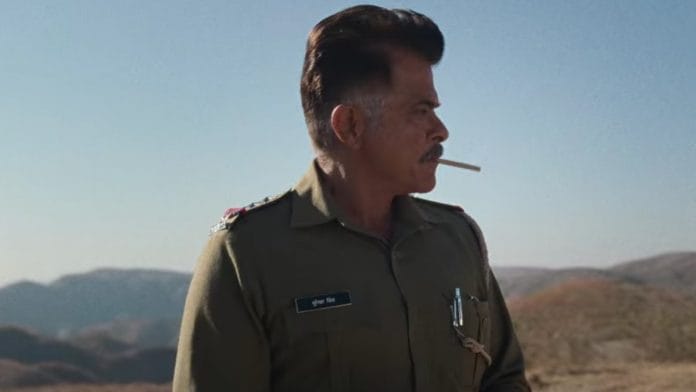From its opening scenes and title sequence itself, Netflix’s Thar pulls out every Western trope in the book and does so quite effectively, featuring artful, extended shots of Rajasthan’s desert near the border accompanied by a killer score. Cinematographer Shreya Dev Dube and music in-charge Ajay Jayanthi draw a beautifully rich canvas proving their worth right off the bat, but judging the quality of the remainder of this 109-minute film is a matter more complicated.
The Western, be it of the neo, dacoit or spaghetti flavours, figures few and far between in contemporary Hindi cinema, mirroring American trends amid the golden age of superhero shared universes. While the 1970s to the 1990s boasted cowboy-centric classics such as Sholay, Bandit Queen, Kaala Sona and Batwara, the closest thing to a mainstream western Hindi release in recent years was Abhishek Chaubey’s Sonchiriya.
Chaubey’s expert presentation of dacoit power struggles, nuanced exploration of caste and sensitive depictions of sexual assault made Sonchiriya a favourite, but the film was a box office failure, grossing just over Rs 10 crore on a 22 crore budget. The genre simply no longer has the broad lucrative appeal it enjoyed in decades past, making OTT platforms a far more viable avenue for such niche passion projects. Thar is just that—an attempt at a neo-Western.
Also read: ‘Multiverse of Madness’ is Scarlet Witch ft Dr Strange in Sam Raimi’s horror masterclass
Starring the father-son duo of Anil and Harshvarrdhan Kapoor and helmed by a frequent Anurag Kashyap collaborator in Raj Singh Choudhary, Thar also marks Netflix’s second major Anil Kapoor feature since the release of the self-referential comedy AK vs. AK in December 2020.
The Kapoors put in serviceable portrayals of a 1980s seasoned cop and an antique dealer from Delhi, and benefit from a reasonable amount of backstories and exposition (albeit cliched) provided by Choudhary’s script.
But they are easily outshined by the unglamourous yet highly capable character actors that make up the rest of the film’s cast. Jitendra Joshi, Sanjay Bishnoi, Sanjay Dadhich, Fatima Sana Sheikh and Mukti Mohan — all make the best of their thinly written roles as local villagers, but the real star of the show is Satish Kaushik as Anil Kapoor’s deputy cop, Bhure.
Kaushik had previously turned heads in 2020 for his delivery of the iconic “Ye Harshad Mehta b****d hai kaun?” line as Manu Mundra in Scam 1992, and he brings similar colour to his portrayal of a police officer who not only loves to cook laal maas but also uses the uniform as a coping mechanism for the discrimination faced by his “lower” caste. Anil Kapoor and Satish Kaushik have shared a special onscreen bonding over the past four decades — from Mr. India (1987) to Ram Lakhan (1989), to Joshilaay (1989) to Fanney Khan (2018) — and one can say Thar also tries to capitalise on that magic.
But when it comes to the film’s numerous flaws, all roads lead to the interesting yet baffling creative decision making of writer-director Chaudhary, as multiple subplots are introduced before being either forgotten about entirely or inexplicably turning up at convenient moments to add additional desert masala.
Also read: Moon Knight, the Disney+ miniseries is a refreshing departure from usual Marvel template
Chaudhary seems to have a lot to say about the time period, the region, the place of women in the local society and police brutality but hasn’t left himself with either enough runtime, or enough efficient usage of the runtime, to properly develop most of these themes. Consider this. For all of the references to the village Munabao’s border location and the hullabaloo made of dacoit drug runners from Pakistan, these dacoits play little role beyond faceless, nameless snipers who pose a distraction to the central characters, rather than having any realistic motivations.
Throughout the film, there also exists is a strange contrast between what Choudhary chooses to show and not show — domestic violence and opium smuggling is implied while gratuitious extended sequences of torture and bloodshed are explicitly laid bare. With the constant cut scenes between the torture chamber and the bedroom, much of the film hurtles long as disjointed vignettes before tying together in a mostly thrilling third act.
But the contributions of Dube, Jayanthi, Kaushik and the other lesser-known names ensure that Thar at least hits the moon in its objective to reach for the stars, securing an ‘A’ for effort and a watchable ‘B minus’ for execution. Come for the Anil-Harshvarrdhan top billing, but stay for the bleak yet distinctive art direction.






